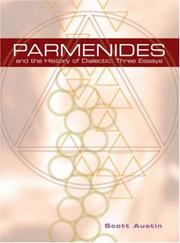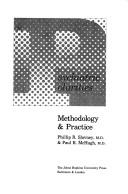| Listing 1 - 10 of 202 | << page >> |
Sort by
|
Book
ISBN: 3110321289 9783110321289 9783110321012 3110321017 9783938793763 3938793767 3938793767 9783938793763 1299723896 Year: 2013 Publisher: Berlin Boston
Abstract | Keywords | Export | Availability | Bookmark
 Loading...
Loading...Choose an application
- Reference Manager
- EndNote
- RefWorks (Direct export to RefWorks)
Few ideas have played a more continuously prominent role throughout the history of philosophy than that of dialectic, which has figured on the philosophical agenda from the time of the Presocratics. The present book explores the philosophical promise of dialectic, especially in its dialogical version associated with disputation, debate, and rational controversy. The book's deliberations examine what lessons can be drawn to exhibit the utility of dialectical proceedings for the theory of knowledge in reminding us that the building-up of knowledge is an interpersonally interactive enterprise subject to communal standards.
Dialectic. --- Polarity --- Polarity (Philosophy)
Book
ISBN: 1108676251 1108681816 1108596789 1108471900 Year: 2019 Publisher: Cambridge : Cambridge University Press,
Abstract | Keywords | Export | Availability | Bookmark
 Loading...
Loading...Choose an application
- Reference Manager
- EndNote
- RefWorks (Direct export to RefWorks)
Ancient dialectic started as an art of refutation and evolved into a science akin to our logic, grammar and linguistics. Scholars of ancient philosophy have traditionally focused on Plato's and Aristotle's dialectic without paying much attention to the diverse conceptions and uses of dialectic presented by philosophers after the classical period. To bridge this gap, this volume aims at a comprehensive understanding of the competing Hellenistic and Imperial definitions of dialectic and their connections with those of the classical period. It starts from the Megaric school of the fourth century BCE and the early Peripatetics, via Epicurus, the Stoics, the Academic sceptics and Cicero, to Sextus Empiricus and Galen in the second century CE. The philosophical foundations and various uses of dialectic are closely analysed and systematically examined together with the numerous objections that were raised against them.
Dialectic. --- Polarity --- Polarity (Philosophy)

ISBN: 1282256122 9786612256127 1930972539 9781930972537 9781282256125 9781930972193 1930972199 6612256125 Year: 2007 Publisher: Las Vegas [Nev.] : Parmenides Pub.,
Abstract | Keywords | Export | Availability | Bookmark
 Loading...
Loading...Choose an application
- Reference Manager
- EndNote
- RefWorks (Direct export to RefWorks)
Dialectic. --- Polarity --- Polarity (Philosophy) --- Parmenides. --- Dialectique
Book
ISBN: 1003384250 1000953262 1032470216 1000953327 Year: 2023 Publisher: Milton : Taylor & Francis Group,
Abstract | Keywords | Export | Availability | Bookmark
 Loading...
Loading...Choose an application
- Reference Manager
- EndNote
- RefWorks (Direct export to RefWorks)
"Drawing upon a wide variety of authors, approaches, and ideological contexts, this book offers a comprehensive and detailed critique of the distinct and polemical senses in which the concept of ressentiment (and its cognate 'resentment') is used today. It also proposes a new mode of addressing ressentiment in which critique and polemics no longer set the tone. Contemporary tendencies in political culture such as neoliberalism, nationalism, populism,identity politics, and large-scale conspiracy theories have led to the return of the concept of ressentiment in armchair political analysis. This book argues that, due to the tension between its enormous descriptive power and its mutually contradicting ideological performances, it is necessary to 'redramatize' the concept of ressentiment. Inspired by Marxist political epistemology, affect theory, postcolonialism, and feminism, the book maps, delimits, and assesses four irreducible ways in which ressentiment can be articulated: the ways of the priest, the philosopher, the witness, and the diplomat. The first perspective is typically embodied by conservative (Scheler, Girard) and liberal (Smith, Rawls) political theory, the second by Nietzsche, Deleuze and Foucault, whereas the third is found in the writings of Améry, Fanon and Adorno, and the fourth is the author's own, albeit inspired by philosophers such as Ahmed, Stiegler, Stengers and Sloterdijk. In producing a dialectical sequence between all four typical modes of enunciation, the book seeks to answer the question by what right do we possess and use the concept of ressentiment, and what makes the phenomenon worth knowing? The Dialectic of Ressentiment will be of interest to scholars and advanced students working in critical theory, social and political philosophy, cultural studies, sociology, history, literature, and anthropology. It will also appeal to anyone interested in (public debates on) the politics of anger, discourse ethics, trauma studies, and memory politics"--
Resentment --- Dialectic. --- Philosophy. --- Polarity --- Polarity (Philosophy) --- Emotions

ISBN: 1421419777 9781421419770 0801834287 9780801834288 9781421419763 1421419769 Year: 1987 Publisher: Baltimore Johns Hopkins University Press
Abstract | Keywords | Export | Availability | Bookmark
 Loading...
Loading...Choose an application
- Reference Manager
- EndNote
- RefWorks (Direct export to RefWorks)
Psychiatry --- Polarity. --- Philosophy.
Book
ISBN: 1438448422 9781438448428 1438448414 9781438448411 1438448406 9781438448404 9781438448411 9781438448404 Year: 2013 Publisher: Albany
Abstract | Keywords | Export | Availability | Bookmark
 Loading...
Loading...Choose an application
- Reference Manager
- EndNote
- RefWorks (Direct export to RefWorks)
"A new perspective on the political significance of the Hegelian dialectical legacy"--Provided by publisher.
Political science --- Dialectic. --- Political philosophy --- Polarity --- Polarity (Philosophy) --- Philosophy.
Book

ISBN: 3110326000 9783110326000 3868383549 9783868383546 3110325217 9783110325218 9783868383546 9783110325218 1299724574 Year: 2013 Publisher: Berlin Boston
Abstract | Keywords | Export | Availability | Bookmark
 Loading...
Loading...Choose an application
- Reference Manager
- EndNote
- RefWorks (Direct export to RefWorks)
The texts of the book are concerned with G. Bergmann's open and new problems and their active role on issues in contemporary metaphysics, like the ontology of ties, connexions and relations, problems of exemplification, substrates and tropes theories, particulars, persistence and the metaphysics of space, time and existence. Papers deal with these themes by themselves, or discuss them in an associated way: some of them aim to clarify the complicated conceptual Relations Bergmann have enlarged with major themes of philosophers like Aristotle, Brentano, Meinong and Sellars. The purpose of the bo
Phenomenology. --- Dialectic. --- Polarity --- Polarity (Philosophy) --- Philosophy, Modern --- Bergmann, Gustav,
Book
ISBN: 9781400868629 1400868629 9780691618630 9780691071664 0691618631 0691019827 0691645639 Year: 2015 Publisher: Princeton, NJ
Abstract | Keywords | Export | Availability | Bookmark
 Loading...
Loading...Choose an application
- Reference Manager
- EndNote
- RefWorks (Direct export to RefWorks)
Kierkegaard's pseudonymous authorship has baffled readers, his apparent capriciousness making it difficult to determine his position at a given point and to understand his work as an organic whole. Gregor Malantschuk's study, based on careful reading of Kierkegaard's journals, papers, and texts, cuts through the authorship problem to clarify the philosopher's key ideas, see the comprehensive plan of his work, and make intelligible the dialectical coherence of his thought. Discussing Kierkegaard's dialectical method and his use of it from Either/Or to the final Two Discourses, Professor Malantschuk shows how coherently Kierkegaard set the individual works in place, so that even the conflict between the principal pseudonyms, Climacus and Anti-Climacus, serves to elucidate his major philosophical ideas. Contents: 1. Anthropological Contemplation. II. Kierkegaard's Dialectical Method. III. The Dialectic Employed in the Authorship. Index.Originally published in 1971.The Princeton Legacy Library uses the latest print-on-demand technology to again make available previously out-of-print books from the distinguished backlist of Princeton University Press. These editions preserve the original texts of these important books while presenting them in durable paperback and hardcover editions. The goal of the Princeton Legacy Library is to vastly increase access to the rich scholarly heritage found in the thousands of books published by Princeton University Press since its founding in 1905.
Dialectic. --- Polarity --- Polarity (Philosophy) --- Kierkegaard, Soren, --- Kierkegaard, Sren,
Book
ISBN: 9789027255662 9789027274908 9027274908 9027255660 1283469316 9786613469311 9781283469319 6613469319 Year: 2012 Publisher: Amsterdam Benjamins
Abstract | Keywords | Export | Availability | Bookmark
 Loading...
Loading...Choose an application
- Reference Manager
- EndNote
- RefWorks (Direct export to RefWorks)
Although the field of polarity is well researched, this monograph offers a new take on polarity sensitivity that both challenges and incorporates previous theories. Based primarily on Swedish data, it presents new solutions to long-standing problems, such as the non-complementary distribution of NPIs and PPIs in yes/no-questions and conditionals, long distance licensing by superordinate elements, and the occurrence of polarity items in wh-questions. It is argued that polarity sensitivity can be understood in terms of evaluability.
Lexicology. Semantics --- Grammar --- Pragmatics --- Swedish language --- Polarity (Linguistics) --- Polarity item (Linguistics) --- Linguistic analysis (Linguistics) --- Grammar. --- Polarity (Linguistics).
Book
ISBN: 1599964430 9781599964430 9781599961620 Year: 2009 Publisher: Amherst, Mass. HRD Press
Abstract | Keywords | Export | Availability | Bookmark
 Loading...
Loading...Choose an application
- Reference Manager
- EndNote
- RefWorks (Direct export to RefWorks)
In the last fifty years, there has been a growing interest in the power of polarities as it relates to leadership and business success. Whether referred to as paradoxes, dilemmas or polarities, research shows that leaders and organizations who manage them well outperform those who don't. In Power Surge, Margaret Seidler takes the basic principles of Polarity Management and translates them to raise self-awareness for both personal and work relationships. Polarity Management principles provide a broader view and give clarity to what makes you strong and potentially stronger. The principles apply
Industrial efficiency. --- Leadership. --- Management. --- Polarity. --- Problem solving.
| Listing 1 - 10 of 202 | << page >> |
Sort by
|

 Search
Search Feedback
Feedback About UniCat
About UniCat  Help
Help News
News